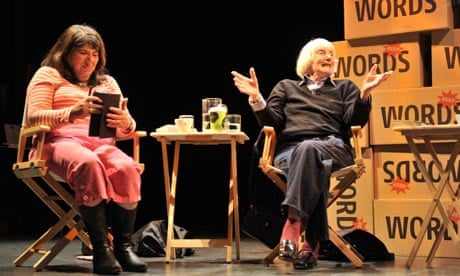Many of the poems in my next book are influenced by the artist Helen Chadwick, whose early work made much use of images of her own body – until a change in the late 1980s. She wrote: "I made a conscious decision in 1988 not to represent my body ... It immediately declares female gender and I wanted to be more deft." I think I am in love with the word "deft", which seems to me to describe exactly how a poet should be – but apart from that I was intrigued by the idea of art that might not declare gender. When I applied the idea to poetry I saw how prescriptive we can be – particularly as readers – in our assumptions about the influence of gender on writing.
A related question has been knocking around in my head for the past few weeks: "Do women genuinely write different poems from men and, if so, what could be said to characterise the 'female' poem?" The occasion which prompted the question happened yesterday, when the Aldeburgh poetry festival and the Poetry Society combined to host an event called The Female Poem, which I chaired, and which boasted a distinguished panel of writers: Maureen Duffy, Annie Freud and Pascal Petit. It was so popular that it sold out in minutes and had to be moved to a larger hall, which suggests the subject is urgent – and not just to women; our audience was mixed.
The other members of the panel had been equally haunted by the question. We realised that for our own day-to-day writing it was perhaps more important not to let thoughts about gender dominate, certainly not at first, so that the language can lead us into places, characters and identities we can't always anticipate. It was pretty clear that such thoughts are not expected of men, though: their poetry is set as a kind of default mode, echoing Simone de Beauvoir's idea that "man is defined as a human being and a woman as female". So while women readers are happy to devour anything that is good, male readers are sometimes nervous of poetry books by women – those with editorial experience among us had noticed it was difficult to get men to review women's books, as if a different, specialised expertise was necessary. Or, that the kudos was less?
But there are advantages: the panel was convinced that a poet ought to be an outsider. The edge, the discomfort makes for clearer vision. Maureen Duffy reminded us of the audacity and courage of Aphra Behn in this regard. Virginia Woolf pinpointed the feeling of an outsider beautifully in A Room of One's Own: "I thought how unpleasant it is to be locked out; and I thought how it is worse, perhaps, to be locked in."
And we all relished the freedom of shifting boundaries; the extreme polarity of male/female doesn't necessarily fit who we are and how we write. The poet can be moved along a continuum of femininity and masculinity in poems to produce the effects or characters needed. We immediately thought of poets who do this, like Keats, or Dickinson. As you might guess, there was no final agreement as to whether there is a distinctly female poetic sensibility: some thought that you could pinpoint a unique openness to the world and the body in women's writing, others thought these were exciting options for any writer, just as territories that might be seen as particularly masculine are open to everyone.

Comments (…)
Sign in or create your Guardian account to join the discussion